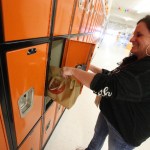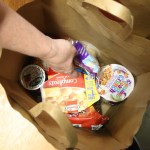Weekend food program is a lifeline for rural Crook County families
Published 2:14 pm Wednesday, April 2, 2025



Vanessa Nolen, Family Access Network advocate, stepped up to put together weekend bags of food for students and families in Crook County who need it. Three years later, her efforts are still going strong.
These food bags bridge the gap for students between school days, ensuring that they are fed over the weekend. Nolen’s work serves families who might live outside of Prineville and might not have access to running water. Some students say food is scarce on the weekends. Central Oregon also has a high rate of youth homelessness, and emancipated high schoolers who don’t have ready access to food need help.
“We have a lot of families that are up Juniper Canyon, a lot of families that are out towards the rez, towards Ochoco Lake, and they’re spread out in a rural community,” said Nolen. “It’s really challenging for families to get into town sometimes on the weekend, or families are working…It’s a supplement for these kiddos to be able to have.”
The weekend food program is run and funded by Crook County School District and is organized by Nolen, who volunteers her time. From 2009 to 2020, Crooked River Elementary School kindergarten teacher Angela Wagner ran the program, often serving hundreds of students at a time because she couldn’t bear to turn anyone away. Former board member Jessica Brumble took over the program until Nolen stepped in in 2022.
“When I saw no one was going to take it over, I panicked and I grabbed it, because I just had such a passion for it,” said Nolen. “To see the kids light up to get their little goodies, or they’re so excited to have food over the weekend.”
Ten families per school
Family Access Network, teachers and other staff members identify students who need help and may be suffering from food insecurity and enroll them in the food program. Nolen includes two breakfast items, two lunch items, two snacks and a drink, as well as a few smaller items such as strawberry gummies, in their weekend bags.
Due to the tight amount of funding, Nolen keeps the program limited to 10 families at each school, though the numbers fluctuate from school to school. There are fewer students enrolled at the high school level. Nolen is also the only volunteer, and has a limited amount of time to put together food bags. She stores the food in her Family Access Network office at Crooked River Elementary. If a family has six siblings, they will each receive a bag, and will only be counted as one family.
“There’s always grace, I’m never going to turn anyone down. There may be a waiting list depending on the highest need,” Nolen said. “On Thursday afternoon, because I’m here at Crooked River Elementary, this is where I’m located, I’m able to go into their little lockers and put their bags in their lockers, so on Friday morning, they get to school, they put their bag in their backpack, it’s super discreet, and they’re off and running for the weekend.”
Nolen passes the bags to secretaries at the other schools early on Friday mornings, and they make sure students come to the office and collect them.
The program originally used backpacks, but it was difficult for kids to remember to bring the bags back, especially if they were moving between parents’ households, and so the district switched to brown bags.
“I tried that one year, it just didn’t feel right, to say, ‘If you don’t bring your backpack back, you can’t get food.’ It just didn’t feel good to me at all,” she said. “We like to filter it through (Family Access Network) because we feel like we’re here to provide those resources and we have extra we can provide.”
‘I listen to what they have to say’
Nolen is very aware that the kids count on the food for the weekends and does her best to make sure she’s providing hearty food, including granola bars, trail mix, apple sauce, popcorn, fruit cups, Capri Sun juices, water, macaroni and cheese, ramen, oatmeal and more. For the high schoolers, she provides soup, pop tarts and beef jerky, among other items. She focuses on non-perishable items.
Some families have specific needs such as being gluten-free, or might not have a microwave, so Nolen makes sure to put in the appropriate food for each family. Certain families she already knows through Family Access Network and she does her best to give additional help if they need it.
“I really try to make it as individual and personalized as I can for these kids, I listen to what they have to say,” said Nolen. “I really rely on these kids’ feedback and the parents’ feedback.”
A few years ago, Nolen had a longer waitlist, and double-checked with everyone to see whether they still needed the help. Some families said they didn’t need to be on the program anymore, though it was helpful when one parent was laid off, for example.
Nolen would accept monetary and food donations from community members and businesses for the program. Food items can be dropped off at Crooked River Elementary. Funding goes through the school district. Nolen would also be willing to pass the program on to an agency or organization to run and encourages those interested to reach out to learn more. Nolen encourages families to reach out if they believe this program would be helpful for them.
“It makes my heart happy to be able to help these kids,” she said. “They’re just so appreciative, and it creates this bond that I have with these kids and it’s just phenomenal.”












